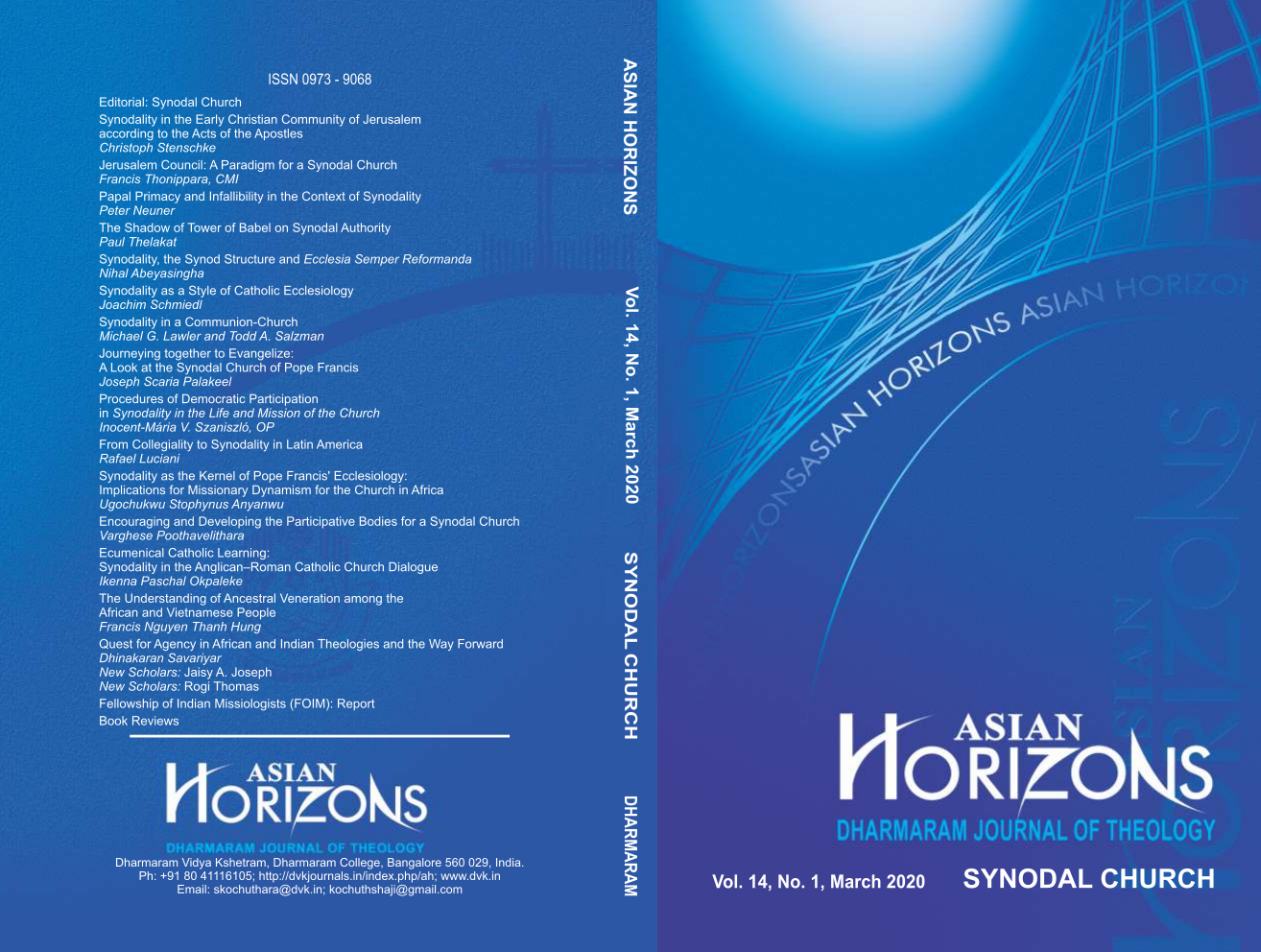Ecumenical Catholic Learning: Synodality in the Anglican–Roman Catholic Church Dialogue
Keywords:
Anglican Church, ARCIC, Dialogue, Ecumenical Learning, Pneumatology, Roman Catholic Church, SynodalityAbstract
There is an increasing awareness of the necessity of synodality in the ecclesiology of the Roman Catholic Church. While this awareness may be attributed to the programme and governance style of Pope Francis, there is also the question of whether synodality could be defined as a subject of ecumenical learning particularly within the context of the international Anglican-Roman Catholic dialogue (ARCIC). To understudy this element of ecumenical learning vis-à-vis synodality, this article examines the idea of ecumenical learning within the context of ARCIC dialogue, analyzes the subject matter of synodality in ARCIC documents in comparison to the increasing awareness of synodality within the Roman Catholic Church, and finally argues for a sustained practice of synodality as a deepening of a pneumatological ecclesiology within the Church. Indeed, where an ecumenical learning is established, it creates the possibility of other forms and subjects of mutual learning thereby reaffirming the conviction that ecumenical dialogue is never a fruitless venture.
References
Adelbert Denaux, “The Use of Scripture in the Agreed Statements of ARCIC,” 249-256 in Adelbert Denaux, Nicholas Sagovsky and Charles Sherlock, ed., Looking Towards a Church Fully Reconciled: The Final Report of the Anglican-Roman Catholic International Commission 1983-2005 (ARCIC II), London: SPCK, 2016.
ARCIC I, The Final Report, “Introduction.”
ARCIC II, “Mary: Grace and Hope in Christ (2005),” in Denaux, et al., Looking Towards a Church Fully Reconciled, 175-241.
ARCIC II, “The Gift of Authority: Authority in the Church III (1999), in Denaux, et al., Looking Towards a Church Fully Reconciled, 123-174.
ARCIC II, Life in Christ, Morals, Communion and the Church (1993).
ARCIC II, The Church as Communion (1990).
ARCIC, Walking Together on the Way: Learning to Be the Church—Local, Regional, Universal: An Agreed Statement of the Third Anglican-Roman Catholic International Commission (ARCIC III), London: SPCK, 2018.
Francis, Address at the Ceremony Commemorating the 50th Anniversary of the Institution of the Synod of Bishops (17 October 2015), http://w2.vatican.va/content/ francesco/en/speeches/2015/october/documents/papa-francesco_20151017_50-anniversario-sinodo.html.
Francis, Address to Members of the International Theological Commission (29 November 2019), http://w2.vatican.va/content/francesco/en/speeches/2019/ november/documents/papa-francesco_20191129_commissione-teologica.html (accessed 21 February 2020).
Francis, Apostolic Exhortation on The Proclamation of the Gospel in Today’s World, Evangelium Gaudium (24 November 2013), http://www.vatican.va/content/ francesco/en/apost_exhortations/documents/papa-francesco_esortazione-ap_ 20131124_evangelii-gaudium.html#Ecumenical_dialogue (accessed 17 February 2020).
IARCCUM, Growing Together in Unity and Mission: Building on 40 Years of Anglican-Roman Catholic Dialogue. An Agreed Statement of the International Anglican-Roman Catholic Commission for Unity and Mission, London: SPCK, 2007.
International Theological Commission (ITC), Synodality in the Life and Mission of the Church (2 March 2018), http://www.vatican.va/roman_curia/congregations/ cfaith/cti_documents/rc_cti_20180302_sinodalita_en.html (accessed 21 February 2020).
Joint Working Group between the Roman Catholic Church and the World Council of Churches (JWG), “Ecumenical Formation: Ecumenical Reflections and Suggestions,” The Ecumenical Review 45, 4 (1993) 490-494; §11.
Joseph Ratzinger (Benedict XVI), “Church’s Synodal Functions,” L’Osservatore Romano, 24 January 1996, 9-11.
Konrad Raiser, “Fifty Years of Ecumenical Formation: Where Are We? Where Are We Going?” The Ecumenical Review 48, 4 (1996) 440-451.
Kristof Struys, “Particular Churches—Universal Church: Theological Backgrounds to the Position of Walter Kasper in the Debate with Joseph Ratzinger—Benedict VXI,” Bijdragen: Tijdscrift voor Filosofie en Theologie 69 (2008) 147-171.
Margaret O’Gara, The Ecumenical Gift Exchange, Collegeville: The Liturgical Press, 1998.
Ofelia Ortega, “Contextuality and Community: Challenges for Theological Education and Ecumenical Formation,” International Review of Mission 98, 1 (2009) 25-36.
Ormond Rush, The Eyes of Faith: The Sense of the Faithful and the Church’s Reception of Revelation, Washington, D.C.: Catholic University of America, 2009.
Paul D. Murray, “ARCIC III: Recognizing the Need for an Ecumenical Gear-Change,” One in Christ 45, 2 (2011) 200-211.
Paul D. Murray, “Introducing Receptive Ecumenism,” The Ecumenist: A Journal of Theology, Culture and Society 51, 2 (2014) 1-8.
Paul D. Murray, “Receptive Ecumenism and Catholic Learning: Establishing the Agenda,” International Journal for the Study of the Christian Church 7, 4 (2007) 279-301.
Paul D. Murray, “Receptive Ecumenism and Ecclesial Learning: Receiving Gifts for Our Needs,” Louvain Studies 33, 1-2 (2008) 30-45.
Paul D. Murray, Receptive Ecumenism and the Call to Catholic Learning: Exploring a Way for Contemporary Ecumenism, Oxford: Oxford University Press, 2008, 5-25.
Paul VI, Apostolic Letter issued Motu Proprio, Establishing the Synod of Bishops for the Universal Church, Apostolica Sollicitudo (15 September 1965), http://www.vatican.va/content/paul-vi/en/motu_proprio/documents/hf_p-vi_motu-proprio_19650915_apostolica-sollicitudo.html.
Peter Phillips, “Synodality and The Gift of Authority,” Theology 103, 815 (2000) 323-330.
Pope John Paul II, Ut Unum Sint.
Raymond K. Williamson, “Receptive Ecumenism in the Context of Bilateral Dialogues,” 147-157 in Virginia Miller, David Moxon and Stephen Pickard, ed., Learning into the Spirit: Ecumenical Perspectives on Discernment and Decision-making in the Church [Pathways for Ecumenical and Interreligious Dialogue], Cham: Palgrave Macmillan, 2019.
Vatican II, Lumen Gentium §13, Unitatis Redintegratio §2, Gaudium et Spes.

